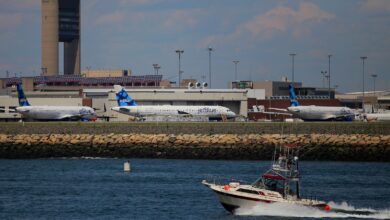Kyiv Says It Broke Up Russian Spy Network Targeting F-16 Fighter Data

Environmentalists are warning of a potential disaster posed by two Russian oil tankers that ran aground in the ecologically sensitive waters off Ukraine’s Moscow-annexed Crimean coastline as local media reported thousands of tons of low-grade fuel has spilled into a major Black Sea shipping lane.
The incidents, which occurred on December 15, left one sailor dead and forced the evacuation of 26 crew members from the vessels Volgoneft-239 and Volgoneft-212.
Officials have said crew error during stormy conditions was to blame and that there was no evidence of any links to Russia’s war on Ukraine.
Both tankers were laden with large cargoes of fuel oil. The Volgoneft-212 is said to have been carrying more than 4,000 tons of the heavy pollutant, leaving the potential for one of the largest environmental disasters ever in the Kerch Strait, which is a key shipping lane.
Russian state news agencies on December 16 quoted sources as saying some 3,700 tons of mazut, a low-quality heavy fuel oil, had spilled into the water.
Social media video verified by RFE/RL showed one of the tankers splitting in half. It was not immediately clear what, if anything, had leaked from the vessels.
“Any oil or petrochemical spill in these waters has the potential to be serious. It is likely to be driven by prevailing wind and currents…and in the current weather conditions is likely to be extremely difficult to contain. If it is driven ashore, then it will cause fouling of the shoreline, which will be extremely difficult to clean up,” Dr. Paul Johnston, head of Greenpeace Research Laboratories in the United Kingdom, said in a statement.
“In consideration of likely significant impacts, the efforts, after saving the crew, should be to prevent or minimize further spillage as feasible. If the ships sink, then there is potential for releases of oil and petrochemicals over longer periods.”
The vessels were were about 7 kilometers from the shore in the Kerch Strait between mainland Russia and Crimea, which Russia illegally annexed from Ukraine in 2014, when they issued distress signals.
In 2007, the strait, which links the Sea of Azov to the Black Sea, saw the Volgoneft-139 tanker split in half during a storm while anchored nearby, spilling more than 1,000 tons of oil.
Greenpeace called on the Russian authorities “to take all efforts to mitigate or reduce environmental impact of the oil spill, and withdraw the navy ships, and stop militarization of the region, returning Crimea under rightful control of Ukraine.”
Isaac Levi, a London-based expert on Russian energy sanctions at the Center for Research on Energy and Clean Air (CREA) said that, although the scale of the situation caused by the two tankers’ sinking remains unknown, “the environmental impact is very likely to be astronomical.”
The cost of cleanup could be upwards of $112 million if the two tankers spilled all their oil products, and $64 million if only the one that broke apart did so, Levi said in a phone interview with RFE/RL.
“It’s a very old tanker, and it does show some degree of negligence to set sail in those conditions, putting the environment at risk, as well as the crew members,” he said of the vessel that broke apart. “It looks like a classic case of negligence or too high risk taken on to sail in stormy conditions.”
Russia uses “shadow tankers” — vessels that are not Western-owned or Western-insured, to skirt sanctions that prohibit it from selling oil and oil products at rates that exceed a set price cap, which varies for crude and different kinds of oil products.
“Shadow tankers that transport Russian oil often undertake dangerous practices that enable Russia to increase its oil export earnings used to fund its war in Ukraine at the expense of maritime ecosystems,” Levi said, “as well as putting crews of the vessels at risk and taxpayers in countries that could end up footing the bill for a cleanup if the tanker has insufficient insurance coverage.”
“It’s warning that these tankers are old, have poor insurance…and frequently engage in dangerous practices such as ship-to-ship transfers and turning off the AIS transponders” that show their location, putting the maritime ecosystem at risk, he added.
According to the Telegram channel Krymsky Veter, the vessel that broke up, Vologneft-212, had not had its Automatic Identification System (AIS) transponder on since December 3. The system provides positioning, identification and other information about the ship to other ships and to coastal authorities.
Evidence indicates the other tanker, Vologoneft-239, had not turned its AIS transponder on since December 11.
Andriy Klymenko, project director at the Kyiv-based Institute of Strategic Black Sea Studies, wrote on Facebook that the vessels are “not seagoing vessels” but are river vessels that are permitted to travel in coastal waters.
According to Klymenko, neither of the tankers was authorized to sail in seas where waves are higher than 2.5 meters, while he said the waves in the Kerch Strait were reaching 3.5 meters on December 15.
Russia’s government said in a post on Telegram that Prime Minister Mikhail Mishustin has ordered a working group be set up to coordinate cleanup, while Natural Resources and Environment Minister Aleksandr Kozlov arrived at the site on December 16 along with other officials to assess the situation.




